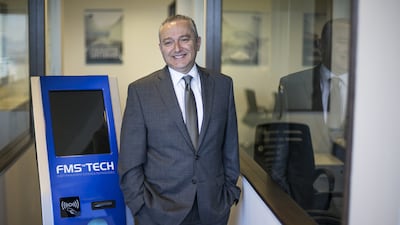ABU DHABI // Transport company bosses are increasingly turning to technology to track every move their drivers make, identify high-risk behaviour and improve road safety.
Fatigue, not leaving a safe distance between vehicles and texting while driving are the most common causes of accidents, said Bassam AlKasser, chief executive of telematics system provider FMS Tech.
“The best way to avert and minimise traffic accidents is to educate drivers on good behaviour and to have the correct road safety policies in place,” he said.
“Fleet managers can monitor and analyse driver behaviour by using in-vehicle monitoring devices,” Mr AlKasser said.
“These systems can encourage good behaviour and provide feedback without the need for human intervention.”
Driver behaviour and profiling tools have been around for some time, said Simon Labbett, project director at Sheida, an Omani road safety body.
“They have the potential to identify at-risk drivers and, for top-performing drivers, they have the potential for their performance to be rewarded,” he said.
“A common failure, however, is that the measurements and values are set by engineers and they have little regard for improving driver safety. They can only measure what is measurable and not the conditions of the actual environment.”
Abu Dhabi-based FMS Tech has gone as far as designing a robot linked to a telematics device installed in vehicles to keep track of drivers’ actions.
The driver merit system (DMS) robot is similar to an automated teller machine that acts a “road-safety consultant”.
The aim is to encourage lorry and heavy vehicle drivers to improve their performance and to simplify the way managers monitor and manage fleets.
“If a system has been independently tested and verified and linked to measurable driver safety performance, then this would be a good development,” Mr Labbett said.
The DMS robot, Mr Alkasser said, is built to “bridge the gap between the driver and the fleet manager”.
“It will deliver the message in a direct, transparent and objective manner to the driver, to avoid subjective human error when it comes to evaluating the driver,” he said.
When the driver reports back to the office, he uses an ID card linked to his vehicle’s monitoring system to access the robot.
The robot will then address the driver using his name, and communicate in his own preferred language. At the moment, it is available in Arabic, English and Hindi.
The driver will receive feedback about his performance based on criteria set by the fleet manager such as speed, the number of trips, time of day, number of breaks, and use of seat belts.
“Any programme that gives a driver spontaneous evaluation of driving behaviour should be a good thing,” said Michael Dreznes, executive vice president at the International Road Federation.
“If a driver is driving poorly, he or she must be aware of the errors or mistakes. If a driver is driving well, that positive recognition could lead to a continuation of the good behaviour or even improved behaviour, especially with the incentive programme.”
The DMS robot was launched for commercial fleets at the Abu Dhabi International Petroleum Exhibition and Conference earlier this month.
“The robot will ‘reward’ drivers for good behaviour,” Mr Alkasser said. “This will help push drivers to behave better on the roads and in turn, improve road safety.”
Fleet management, including monitoring and providing feedback, is good practice and enables safe driving behaviour outside the company, said Dr Britta Lang, the UAE country director of Transport Research Laboratory.
“It isn’t exactly a new idea and many global companies have implemented impressive systems to manage the transport risk of their employees,” she said.
Fleet managers will gain greater insight into the performance of their drivers and vehicles and increase efficiency, according to Thomas Colaco, a transport expert in Dubai.
“Real-time, verbal coaching technology would help drivers understand exactly how they need to drive their vehicle to be both safe and efficient,” he said.
rruiz@thenational.ae

